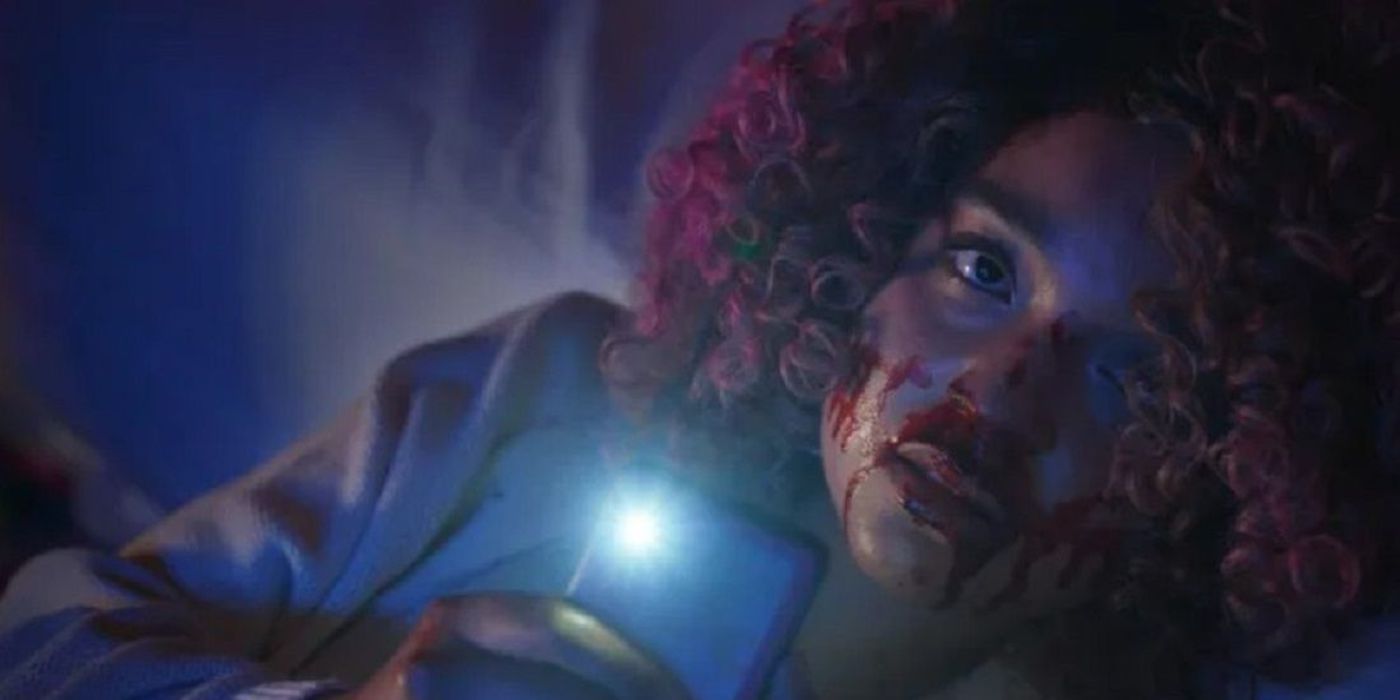The concept of bullying has been around in film for ages when it comes to adolescence and the portrayal of female friendships on screen. In Sissy, writer-directors Hannah Barlow and Kane Senes tackle these issues through their character Cecilia, a 20-something social media influencer with a yearning for being needed and well-liked. Not too far off from the realities of acquiring internet fame, their script provides a foundation for decent commentary on bullying, seeking validation, and growing from past trauma. Yet, it stumbles in execution. Sissy sacrifices its themes for violence and surface-level explorations of psychological realism, making it as frustrating as it is compulsively fun.
Cecilia (Aisha Dee) is a successful social media influencer who appears to have it all. Living the dream as an independent and modern millennial woman, nothing can stand in Cecilia’s way of feeling special. That is, until she reunites with her ex-best friend, Emma (Hannah Barlow), from her pre-teen years after over a decade of separation. Cecilia and Emma had plans to grow old together and never let anything come between them until Alex (Emily De Margheriti) came into the picture. And even years later, cattiness is still at the forefront of their interactions. During Emma’s bachelorette party get-away at a remote cabin in the mountains, Alex proceeds to make Cecilia’s weekend a living nightmare. Unfortunately, it doesn’t bode well for the entire party.
It is clear from the opening sequence of Sissy that Cecilia merely appears to have it together when in reality it’s all a façade. After a broadcast to over 200,000 followers, requesting them to repeat her coined mantra, “I am loved, I am special, I am enough,” the camera pans out to reveal Cecilia’s true livelihood. She lives alone in a cluttered apartment, spends time eating terrible food while basking in reality TV, and she frequently checks her phone for validation from her fan base. All this happens in between nightmares from a troubling accident that awakens Cecilia from her sleep. For even the most put-together social media influencer, all isn’t what it seems, which is where Sissy’s script tends to excel.
This type of analysis on the pressures of social media is only amplified when one factors in Cecilia’s traumatic past. Of course, all gets revealed in due time, but there is great commentary on Cecilia’s reliance on the happiness that she gets from uplifting others with respect to her inability to live outside that framework. Flashbacks to this traumatic event enable viewers to catch a glimpse of who Cecilia was and has evolved into. But it’s also when Senes and Barlow’s screenplay weakens, as they have difficulty saying anything about pragmatism in the context of Cecilia’s wellbeing. She is, after all, reuniting with her former BFF, who doesn’t appear to acknowledge anything about their past besides their friendship. Additionally, Cecilia happily accepts Emma’s bachelorette party invitation without questioning the logistics or guest list. It doesn’t seem realistic for a girl who has gone through so much and has seemingly found serenity through protecting her mental health.
Even with all these problems at the surface, identifying exactly where Sissy goes wrong is difficult when so much about its concept works great on paper. However, Barlow and Senes manage to blur the lines between this plausibility and analysis when they settle for violence and hysterics in lieu of responsibility. Take Cecilia’s backstory with Alex, for example. While the directors are careful to finally reveal what happened between these two characters, there’s too much missing in between the action and recovery to show why Cecilia felt her actions were appropriate reactions to the bullying she faced in the past and present. Sissy suffers from any sense of normalcy and reality as Cecilia spends most of her adult days in a virtual one. There’s a lack of accountability among all the characters, which turns this thrilling commentary on mental health into a surface-level assessment of emotional contention.
When all is said and done, Sissy is conflicting. There’s plenty of fun to be had with frequent gorgeous and violent sequences, but these things come at the expense of hammering down on its themes related to bullying, healing from past trauma, and responsibility. It's a shame because Aisha Dee truly gives an exceptional performance. Yet with a heavy focus on psychopathic tendencies and outbursts by the lead, Barlow and Senes never give viewers any reason to believe that these are intrinsic to Cecilia’s core being. Thanks to some gaps in the history among its leads, Sissy isn’t as compelling as it should have been. The dark thriller begins as one that demands conversations on social media and mental health, but becomes a film focused more on shock and awe.
Sissy released on Shudder Thursday, September 29. The film is 102 minutes long and is not rated.

.jpg)
.jpg)
